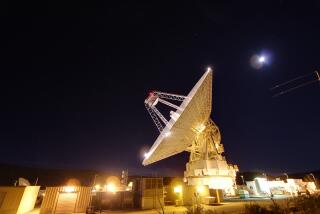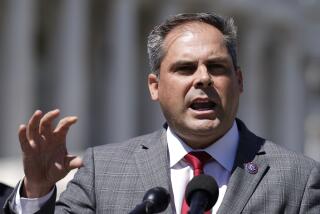NASA Deserves Better
America’s record budget surplus has left the nation more able than ever to reach for the stars, but to the astonishment of scientists a House appropriations subcommittee on Monday approved a spending bill that increases most federal agency budgets but takes a $1.4-billion bite out of NASA’s budget. That’s 11%. Worse, the cut tends to target the agency’s most cost-efficient and significant projects. Officials at Pasadena’s Jet Propulsion Laboratory say the change would sharply set back JPL research.
The decision of the Republican-dominated subcommittee to scrap the Triana satellite was easy enough to understand. In that oddball project, a camera on the satellite would broadcast a live picture of Earth over the Internet, an idea conceived by Vice President Al Gore. Its demise wouldn’t slow the forward march of science, but the subcommittee’s other cuts would. They include:
* $100 million for the Space Infrared Telescope, which would enable scientists to detect “brown dwarfs,” substellar objects that the existing Hubble and Chandra space telescopes have trouble seeing. Their number and density must be known in order to calculate the mass of the universe and thus its age and ultimate fate.
* $200 million for the Earth Observation system. This proposal for a network of satellites--conceived in the Reagan administration and officially initiated by President George Bush--would create Earth’s first integrated system for understanding how clouds and other fine particles affect global temperatures and climate. The answers could help nations prepare for hurricanes, droughts, global warming and other climatic changes.
NASA director Daniel S. Goldin turned NASA into a model for efficient, small government projects. In the 1960s NASA used 4% of the nation’s budget to put a man on the moon--an inspiring endeavor that nonetheless yielded only marginal scientific returns. Today the agency’s far more economical missions reap huge amounts of worthwhile data while consuming less than 1% of the federal budget.
That’s why members of the full House Appropriations Committee should restore NASA’s funding when they take up the agency’s budget on Friday. Democrats on the committee are expected to support restoration, but Republican members might need persuading. You can encourage them by calling the numbers below.
To Take Action: Reps. Jerry Lewis (R-Redlands), (202) 225-5861; Ron Packard (R-Oceanside), (202) 225-3906, and Randy “Duke” Cunningham (R-San Diego), (202) 225-5452.






